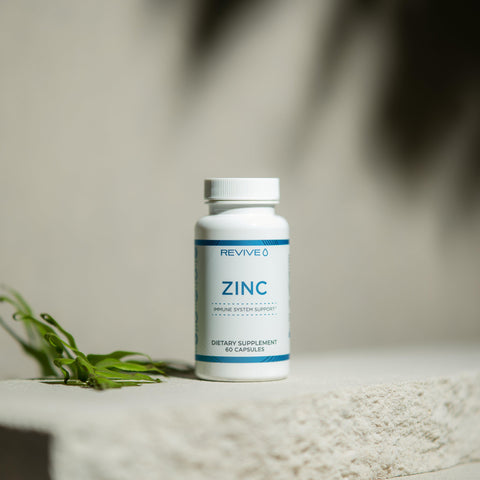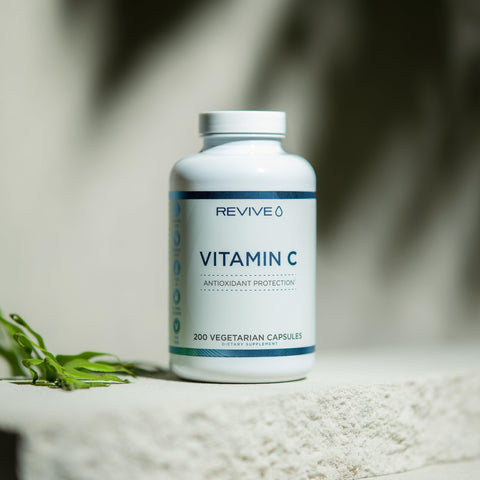Benefits of Vitamin C and Zinc on Health
Certain nutrients play a more important role than you might think when it comes to keeping your immune system strong and healthy. Among these nutrients, zinc and vitamin C stand out because of their immune functions (i.e. they’re both really great at preserving physical tissue barriers).
Clinical trials show that a lack of vitamin C supplementation, zinc, or both could potentially impair the immune response. When it comes to fighting a common cold or speeding up your recovery, there are quite a few myths out there about which supplements are actually helpful. As you may or may not know, vitamin C and zinc are at the top of the list.
The truth is that, while vitamin C and zinc are great for your immune system, they do not tend to be very effective home remedies for colds. The good news is that a daily intake of vitamin C and zinc supplements will help you in other ways.
In this article, we’ll be discussing the impact of vitamin C and zinc on health. If you’ve been considering taking vitamin C or zinc supplements to help boost your immune system, you’ve come to the right place. Revive MD is here to answer any questions you might have!

What Is Vitamin C?
Vitamin C (also known as ascorbic acid) is an essential nutrient your body needs to build blood vessels, cartilage, muscles, and collagen in your bones. Vitamin C is also important for your body’s healing processes.
This antioxidant helps protect your cells from the effects of free radicals — molecules that are produced when your body breaks down food or is exposed to radiation from cigarette smoke and the sun, X-rays, or other sources. Free radicals can contribute to health conditions like heart disease, cancer, and other diseases.
Since your body does not produce vitamin C on its own, you must get it from your diet. Vitamin C is found in citrus fruits, berries, potatoes, tomatoes, peppers, cabbage, Brussels sprouts, broccoli, and spinach. Vitamin C is also available as an oral supplement, usually in the form of capsules.
Most people are able to get enough vitamin C from eating a balanced diet. Vitamin C deficiency is more likely in people who smoke or are exposed to smoking, who have certain medical conditions (like gastrointestinal diseases or cancers), or who have a restricted diet that does not include enough fruits and vegetables.
A severe deficiency of vitamin C can lead to a disease called scurvy, which causes anemia, bleeding gums, bruising, and poorly healing wounds. If you take vitamin C for its antioxidant properties, remember that a supplement may not provide the same benefits as natural antioxidants in food — that’s why we recommend taking vitamin C supplements and eating a balanced diet!

What Is Zinc?
Zinc is super important for our bodies. It keeps our immune system strong, helps us digest food, and even helps wounds heal faster. Plenty of zinc already exists within your body, but it’s still important to get zinc from your diet. Foods like chicken, red meat, and certain cereals are packed with zinc.
Zinc can also help fight off cold symptoms. Research suggests that if you take zinc when you first start feeling sick, it might make your cold shorter. Zinc is also great for helping wounds heal faster, especially if you don't have enough zinc in your body. It can even help kids with the types of stomach problems that are caused by low zinc levels.
Another thing zinc is good for is protecting your eyes as you get older. There's some research showing that taking zinc supplements might slow down a certain disease that makes your eyesight worse over time. Remember, though, that it's important to talk to your doctor before starting zinc supplements. Sometimes, they can cause problems if you’re taking other medications.
How Vitamin C and Zinc Can Help Boost Your Immune System
When you feel the flu coming on, getting your symptoms under control is going to be the most important thing. This is because the flu is actually a type of virus and there is no good way to fight a virus with drugs and supplements. Contrary to popular belief, you cannot actually "kill" the flu with antibiotics.
For this reason, most people end up using products that get rid of mucus, soothe their sore throats, and clear their sinuses. You can also fight common colds and the flu by strengthening your immune system, and that's where a dose of vitamin C and zinc come in. Both vitamin C and zinc effectively strengthen the immune system.
The problem is that when you're fighting a cold, you're not getting enough of these two nutrients to boost your immune system. Instead of just taking vitamin C and zinc when you have a cold, you should use these supplements year-round to avoid getting sick in the first place. Thankfully, getting into the habit of doing this shouldn’t be too difficult!

So, will taking vitamin C and zinc really boost your immune system? If so, then how? Experts say there is little evidence to support the theory that vitamin C can prevent respiratory illnesses, including the common cold. However, studies have shown that taking vitamin C can help shorten the duration of a cold.
An examination of the research results revealed that colds can be reduced by 8 to 14% in adults and children. The caveat, of course, is that people should take vitamin C all the time, not just when they’re sick.
Similar to vitamin C, taking zinc cannot actually prevent colds. However, evidence suggests that zinc shortens the length of colds — which is great news. According to one study, colds were shortened by 30-40% in people who took zinc lozenges.
If you’re considering adding zinc to your cold recovery plan, you should ideally look for supplements that contain at least 50 mg of zinc. Thankfully, Revive MD has such zinc supplements available!
The Potential Side-Effects of Taking Vitamin C Supplements
While taking vitamin C supplements at the appropriate amounts is generally quite safe, going overboard can cause problems. Side effects may include upset stomach, nausea, vomiting, diarrhea, heartburn, and cramps. Some people might also feel tired or have trouble sleeping after taking vitamin C supplements. Some have reported getting headaches and flushed skin as well.
On rare occasions, taking too many vitamin C supplements can even lead to kidney stones, especially if you're taking more than 2,000 milligrams every day for an extended period of time. It's super important to let your doctor know if you're taking vitamin C before getting any medical tests done because having too much vitamin C in your system might mess with the results of blood tests.
You should also be careful about mixing vitamin C with other medications. For example, taking vitamin C might make your body soak up more aluminum from certain medications, which is not ideal for people with kidney problems.
There's also some concern that using antioxidants like vitamin C while getting chemotherapy could make the chemotherapy drugs less effective. Also, if you're taking birth control pills (or doing any type of hormone therapy), taking vitamin C might mess with your hormone levels.
Furthermore, if you're taking medicine for high cholesterol (like statins or niacin), taking vitamin C might make them less effective. This is why it’s so important to talk to your doctor before you start taking vitamin C supplements (or any supplements, for that matter). Revive MD’s supplements are designed with safety in mind, but you can never be too cautious!
The Potential Side-Effects of Taking Zinc Supplements
Taking zinc supplements can be especially helpful for people with low levels of zinc and might even shorten a cold if you start taking them right when you start to feel symptoms. While supplements are great, it’s not recommended to use zinc sprays in your nose because they could potentially make you lose your sense of smell.
When it comes to safety and possible side effects, taking zinc supplements might cause problems like indigestion, diarrhea, nausea, vomiting, or headaches. It’s also important to be aware of how zinc supplements interact with other medications.
For example, if you're on antibiotics (like quinolone or tetracycline), taking zinc at the same time might make the antibiotics not work as well. To avoid this, you should take the antibiotic a few hours before or after you take the zinc supplement. The same goes for combining zinc with drugs like penicillamine — you should wait a while between taking them to make sure they’re both working properly.
Should You Take Vitamin C and Zinc Together?
We often hear about the benefits of vitamins and minerals when taken on their own. However, you might have noticed that many supplements on the market combine different nutrients into one pill. This isn't by chance; there are specific reasons for this.
Vitamin C and zinc, for example, are often combined into one supplement. This makes sense, because vitamin C and zinc both play important roles in supporting the immune system and lowering the risk of diseases.
Even more interestingly, since vitamin C contains ascorbic acid, some believe that it aids in the absorption of zinc. However, while there's ongoing research on this, conclusive results are still pending.
Does this mean that you should take vitamin C and zinc supplements together? Maybe, but that will entirely depend on whether you have a vitamin C or zinc deficiency. As always, you should ask your doctor before taking (let alone combining) dietary supplements.
Takeaway
Vitamin C and zinc are critical for immune health, particularly against viral and respiratory infections. Vitamin C boosts white blood cells and has antiviral activity, potentially easing severe symptoms. Zinc inhibits virus replication and supports the immune response. Both nutrients are vital, especially if there's a vitamin D deficiency, which increases infection risk. Together, vitamin C and zinc strengthen the body's defense against viral infections, underscoring the importance of adequate intake for maintaining health.
They are also crucial in combating infectious diseases by bolstering immune defense. Nutritional deficiencies can weaken immunity, potentially leading to symptoms like loss of smell. Ensuring adequate intake of vitamin C and zinc helps strengthen the body's resistance against infections.
Boost Your Immune System With Revive’s Zinc and Vitamin C Supplements
When you’re not feeling well, there’s nothing better than a little extra vitamin C (or zinc — or both!). While vitamin C and zinc won’t “cure” a common cold or the flu, they can boost your immune system if you take these supplements regularly. This means that you’ll be a lot less likely to get sick in the first place.
In fact, customer reviews on Revive MD’s website have stated that, since taking Revive’s vitamin C supplement, they haven’t gotten sick in over a year. This just goes to show how effective Revive’s supplements are. Feel free to check out our wide selection of supplements and start boosting your immune system today!

The information being presented in this blog is intended to be used as educational or resource information only. It is not intended to be a substitute for medical advice from your healthcare provider. This content should not be used for the diagnosis or treatment of any medical condition. If you have any questions or concerns about your health, please contact your healthcare provider. You should call 911 for all medical emergencies. Revive MD is not liable for any advice or information provided on this blog, which advice or information is provided on an “as-is” basis, and assumes no liability for diagnosis, treatment, decisions, or actions made in reliance upon any advice or information contained on this blog. No warranties, express or implied, are made on the information that is provided.

